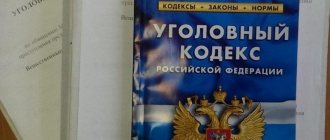Deliberately causing harm to things and objects entails administrative or criminal liability. Depending on the circumstances, the culprit may face a fine for damage to property, various terms of work, and even imprisonment. Unintentional but costly damage to property is Article 168 of the Criminal Code of the Russian Federation, the punishment for which will be a penalty within the limits of the annual salary. Damage to property by minors is also an offense for which the child’s parents or the child himself will be held accountable if the crime is classified under separate articles of the Criminal Code.
Intentional damage to property - Article 168 of the Criminal Code of the Russian Federation
The law obliges citizens to be responsible for their actions that cause harm to other people. We are talking about personal financial responsibility provided for in Article 1064 of the Civil Code of the Russian Federation, as well as responsibility to the state and society. The current versions of the Criminal Code and the Code of Administrative Offenses contain a number of rules defining punishment for material damage to someone else’s property.
Article 168 of the Criminal Code of the Russian Federation implies liability for careless actions with fire, gas or other sources of danger, as a result of which losses to third parties amounted to more than a quarter of a million rubles. The conditions for holding people accountable under this standard include everyday negligence, for example, a fire at a neighbor’s dacha due to carelessness at the barbecue and the negligence of employees at work.
The punishment for the culprit may be:
- a fine of up to 120 thousand rubles;
- compulsory, forced or correctional labor;
- restriction or imprisonment for up to a year.
Arbitrage practice
In the event of an unintentional arson of property, the guilty party is forced not only to compensate the victim for losses, but also, in some cases, to pay a fine.
For example, if the culprit unintentionally caused damage to an expensive car worth more than 250 thousand rubles, he will additionally be required to pay a fine of up to 120 thousand rubles to the state or serve another penalty other than compensation for damage to the victim.
In the event of intentional damage to someone else’s property in an amount exceeding 5 thousand rubles, the severity of the damage caused to the victim is also assessed. For example, having destroyed an item worth 6 thousand rubles, the owner of which has an income of about 8 thousand rubles a month, the defendant will be required to pay, in addition to compensation for the cost of the item, a fine or be sentenced to other criminal penalties. If the owner of a destroyed item worth 6,000 rubles has an income of over 100 thousand rubles per month, no criminal punishment will follow.
Still have questions about the degree of guilt in damaging someone else's property? Ask them in the comments
Damage to property due to negligence
Note! In cases where damage caused by negligence does not fall under the definition of “major” and is not related to the circumstances specified in Article 168 of the Criminal Code, unintentional actions do not entail liability under the law.
The culprit must compensate the owner of the damaged item for losses, although in some cases he can avoid even this responsibility. Thus, according to paragraphs 2-3 of Article 1064 of the Civil Code of the Russian Federation, you can not pay for damage to property if he acted at the request of the owner, or the damage to things was caused not by his manipulations, but by third-party circumstances that arose during the same period of time.
Brief Definition
Damage is the loss of the original qualities of an object as a result of exposure to external factors.
Property is defined as a set of objects that have material value and are owned by an individual/legal entity, municipality or state.
Thus, the answer to the question of what property damage is may be:
- damage – when a material object partially loses its operational characteristics and cannot be used for its intended purpose;
- destruction – when further use of a thing becomes impossible.
The definition of property damage includes both intentional and unintentional damage.
We recommend reading: “Application to a district police officer against unlucky neighbors: pitfalls, writing samples.”
Intentional damage to someone else's property
The presence of intent, that is, awareness of the damage caused, is a key factor in holding liable for damage to other people's things, vehicles, real estate and other property. At the same time, the reasons that prompted the defendant to take out his emotions on someone else’s property are not important according to the law. Jealousy, interpersonal conflict, confrontation in the work collective - the law requires that all these quarrels be regulated in a steam field, without resorting to violent actions, for which the culprit will have to answer, regardless of whether he is right in the main dispute.
For the law, motive is important only when it is related to:
- hooliganism, that is, expressed disrespect for order and social principles;
- inciting hatred towards one of the social groups on ethical, religious or other grounds.
Both factors are aggravating and increase the responsibility of the culprit. Also, more severe punishment is provided for those who used a method dangerous to society to damage someone else’s property, or for those whose actions unintentionally led to serious consequences, including human casualties.
In addition, a significant factor in determining the type of liability to which the attacker will be held is the amount of damage caused - the cost of hopelessly damaged property or the amount of funds required for repairs and restoration work. Damage is considered significant if it exceeds 56 thousand rubles, large - from a quarter of a million, especially large - from a million rubles.
How is vandalism different from intentional damage?
There are indeed similarities between the two crimes. But at the same time, there are big differences:
- Intentional damage is aimed at items that were purchased by a person with his own money or made independently. Regardless of their cost, these things are of particular value to humans and their destruction is a serious blow. Such items include not only things, but also various papers that have legal value.
- Vandalism refers to aggressive actions aimed at buildings, structures, monuments and other objects of this kind. Vandalism can be directed at public transport and many other objects that belong to the state.
What to do if your property is destroyed
The first question that the owner of the damaged object must answer in order to determine the procedure for his actions to compensate for the damage is the identity of the offender. If it is known, for example, the property was damaged during a quarrel with the owner, the incident was seen by third parties or was recorded by CCTV cameras, and the intruder can be easily identified from the footage, the owner of the property can choose: contact the police or limit himself to a civil lawsuit. If not, you need to submit an application to law enforcement agencies to identify the attacker and bring him to justice.
The next step is to determine the amount of damage. Legal entities of all forms report damage to property or damage caused to it in order to write off unusable items from the balance sheet or allocate funds for repairs. Citizens participate in drawing up a property damage report in the event of damage to housing, for example, by flooding. In other cases, evidence of damage is confirmed by photographs and remains of the destroyed item, documents on the ownership of the damaged item, purchase receipts, registration certificates for vehicles and gadgets and other documents confirming the market value of the broken item. If the damaged property needs to be repaired, you will need a certificate from a specialized organization about the cost of the work. These documents will help the police determine the amount of damage to qualify a crime under the administrative or criminal code, and the victim - to determine the amount of the claim for recovery.
Further, the victim’s actions depend on whether law enforcement officers were involved in the case. If:
- No, then the owner of the property can prepare a claim for damages (the document allows the issue to be resolved in a pre-trial mode) and a statement of claim to the court.
- Yes, it is more reasonable to wait for the completion of the investigation, which will reliably establish the identity of the attacker and prepare evidence of his guilt. Article 44 of the Criminal Procedure Code of the Russian Federation allows victims to submit documents to the court with a claim against the defendant throughout the period of the police investigation and during the trial of a criminal or administrative case.
Drawing up an act of damage to someone else's property
Authorized officials are involved in drawing up acts. In case of damage to the property of a legal entity - employees of the company or institution, in case of damage to the property of a private person, for example, an apartment and interior items, employees of the servicing management company. In addition to the owner of the damaged premises, neighbors are often involved in drawing up the act, invited as witnesses. The document contains several required parts:
- name, number, date and place of compilation;
- information about the organization that suffered damage or the private owner of the damaged property;
- a detailed description of the damaged property - from the address of the apartment to the make and model of damaged equipment;
- preliminary damage assessment;
- the cause of damage and details of the culprit, if known;
- data and signatures of all participants in drawing up the act.
The procedure for collecting compensation for damage to someone else's property
If the amount of losses does not exceed 50 thousand rubles, you can contact the magistrate at your place of residence or the defendant’s registered address, if more - to the district court. The application is submitted on a standard court form, which can be obtained from the office or on the official Internet resources of the judicial authorities. The document contains:
- the name of the court in which the claim is filed;
- details of the plaintiff and defendant;
- statement of the circumstances of the incident;
- information about witnesses, if any;
- amount of claim;
- legal basis for recovery;
- list of documents confirming the stated facts.
If the application to the court is filed as a civil claim, the police were not involved in the case, or the actions of the culprit did not contain elements of a crime, but still caused material harm to the applicant, the state duty is calculated based on the amount claimed for collection. If the claim is supplemented by police materials that confirm that the damage was caused during the commission of a crime, there is no need to pay a state fee.
Damage to someone else's property by minors
Children and adolescents are not subject to criminal or administrative liability until the age of 16. During this period, parents or guardians are responsible for their actions, including financially. In addition, if a child has committed an offense, his adult representatives are additionally charged under Article 5.35 of the Code of Administrative Offenses of the Russian Federation for improper education of a minor. The sanction of the article involves a fine for the offender’s parents in the amount of 100 – 500 rubles.
The exceptions are two provisions of the Criminal Code, according to which a teenager will be independently responsible for damage to property from the age of 14:
- Article 214 – vandalism, that is, damage to public property (transport, street equipment, etc.) or actions offensive to society in relation to buildings and structures. Punishment can be imposed in the form of compulsory or correctional labor, arrest for 3 months or a fine of up to 40 thousand rubles. If the motive for the offense was interethnic, religious or political hostility, the defendant faces up to 3 years of restriction or imprisonment.
- Part 2 of Article 167 applies when someone else’s property was damaged as a result of arson, fire or other action dangerous to others, as well as if the attackers proceeded from hooligan motives and in the case when people were injured during the incident. Those involved face up to 5 years of forced labor or imprisonment.
Note! If the court makes a decision on a monetary penalty, the parents are obliged to help the minor find funds to pay the fine, but the criminal record will already be reflected in the child’s biography.
“Safety of students’ property, prevention of loss, theft and damage to property.”
Semernina Natalya Vladimirovna, primary school teacher
Municipal educational institution "Yasnozorenskaya secondary school"
Yasnye Zori village, Belgorod district, Belgorod region.
REPORT FOR SPEECH AT A SCHOOL-WIDE PARENT MEETING ON THE TOPIC:
“Safety of students’ property, prevention of loss, theft and damage to property.”
From the first days of school, teachers explain to children the rules of behavior in the educational institution. Class hours, extracurricular activities, and individual conversations with children are often devoted to what can be done at school and what absolutely cannot be done. Teachers have a great responsibility for the life and health of each child. In addition, teachers and the administration of the institution are responsible for the property that is in the school. Considering that school is a place where children attend in large numbers, it is rare that anyone in an educational institution can avoid incidents involving damage or theft by a child of school property and the property of other students. Children can break chairs, draw on desks, break glass and take other people’s things, etc. In this regard, parents often have to compensate for the damage caused.
These days, the main subject of criminal attacks is a cell phone and money. An item that can be easily taken away and easily sold. Often, when parents buy an expensive item for their child, they do not explain the safety rules. Cases when a child himself gives a phone or tablet to acquaintances or even strangers take second place after thefts and robberies. Often teenagers, unwittingly, become the target of crime by older children. Parents, do not forget that if you buy a cell phone, give a large amount of money to your child, or show care and concern about him, the opposite may happen - your child will become the object of a crime with serious consequences.
To avoid such situations, I would like to once again remind parents and children of the safety rules for using cell phones and expensive things in public and crowded places:
— in public places, you do not need to show your cell phone;
— teenage schoolchildren should not leave their cell phones and other expensive things unattended in accessible places (in classrooms, locker rooms, gyms, etc.);
- do not give your cell phones to anyone, even classmates;
— parents need to hold explanatory conversations with their children as often as possible about the safety rules for using expensive things in public and crowded places.
Responsibility of students under 14 years of age
For harm caused to a minor under fourteen years of age (minor), his parents (adoptive parents) or guardians are responsible, unless they prove that the harm did not arise through their fault (Clause 1, Article 107 of the Civil Code of the Russian Federation).
Criminal liability of minors
A person who has reached the age of sixteen at the time of committing a crime is subject to criminal liability. Persons who have reached the age of fourteen at the time of committing a crime are subject to criminal liability for theft (Article 128), robbery (Article 161), robbery (Article 162), extortion (Article 163).
Article 158 of the Criminal Code of the Russian Federation - Theft,
those. secret theft of someone else's property - punishable by a fine in the amount of 80 to 500 thousand rubles, or compulsory labor for a period of 180 to 240 hours, or correctional labor for a period of 6 months to 2 years, or arrest for a period of 2 to 4 months, or imprisonment for a term of up to 2 to 10 years.
Article 159 of the Criminal Code of the Russian Federation - Fraud,
that is, the theft of someone else's property or the acquisition of rights to someone else's property by deception or abuse of trust, is punishable by a fine in the amount of up to 120 thousand rubles or in the amount of the wages or other income of the convicted person for a period of up to one year, or by compulsory labor for a period of up to 180 hours, or correctional labor for a term of 6 months to 1 year, or arrest for a term of 2 to 4 months, or imprisonment for a term of up to 2 years.
Art. 161 of the Criminal Code of the Russian Federation
-
Robbery,
i.e. open theft of someone else's property is punishable by correctional labor for a term of one to 2 years, or by arrest for a term of 4 to 6 months, or by imprisonment for a term of 4 to 12 years.
Article 162 of the Criminal Code of the Russian Federation
-
Robbery,
i.e. assault for the purpose of stealing someone else's property, committed with the use of violence dangerous to life and health, or with the threat of using such violence - is punishable by imprisonment for a term of 3 to 15 years.
Article 213
Criminal Code of the Russian Federation -
Hooliganism,
i.e. gross violation of public order, expressing clear disrespect for society, committed with the use of weapons or objects used as weapons - is punishable by compulsory labor for a period of 180 to 240 hours, or correctional labor for a period of 1 to 2 years, or imprisonment for a period of 1 to 2 years. period from 5 to 7 years.
Is the school obliged to compensate the child and his parents if things or money are stolen from the child at school?
Often, teachers at meetings explain to parents that there is no need to bring expensive things to school, for example, tablets or expensive phones, or large sums of money. This is due to the fact that the school is not responsible for the safety of these items. The school should not compensate for such losses. If a child’s phone was stolen at school, and then they found out who did it, then the parents of the minor child who stole the item must compensate for the damage. Responsibility for upbringing in this case lies with the parents.
Actions of the school when determining the fact of damage to school property
If the fact of violation of the school’s Charter and, as a result, damage to property has been established, then teachers who were called upon to provide supervision for children must write explanatory notes. If the case is serious, parents must be notified. The fact of damage must be recorded. You can collect a commission that will assess the losses caused. The damage may be minor, but it may also entail various adverse consequences for the class, complex repairs, calling various specialists, etc.
In many ways, the actions of students who deliberately damage school property, steal phones and money are related to their upbringing and the rules of behavior learned in the family. It is better for parents not to ignore the facts of their child’s bad behavior, especially if there are any consequences. When a child systematically violates the Charter of an educational institution, is on the internal school register or in the commission for minors, then such a student needs a special approach from various school specialists. If children accidentally break, take or spoil something, then most often a conversation with the class teacher and notification of parents is sufficient.
Thank you for your attention!
Municipal educational institution
"Yasnozorenskaya secondary school
Belgorod district, Belgorod region"
Report of a speech at a school meeting
November 30, 2021 on the topic:
“Safety of students’ property, prevention of loss,
theft and damage to property"
Completed by: Semernina Natalya Vladimirovna,
primary school teacher
Municipal educational institution "Yasnozorenskaya secondary school"
P. Clear Dawns 2021







